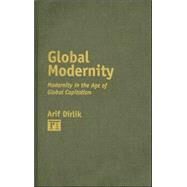Global Modernity: Modernity in the Age of Global Capitalism
, by Dirlik,Arif- ISBN: 9781594513220 | 1594513228
- Cover: Hardcover
- Copyright: 12/15/2006
In his provocative new book Arif Dirlik argues that the present represents not the beginning but the end of globalization, which has produced a new era in the unfolding of capitalism''global modernity.' The globalization of capitalism following the fall of socialist competitors in the 1980s generated culturally informed counter-claims to modernity. Modernity, globalized, has resulted in the fragmentation of the very idea of modern. Dirlik's 'global modernity' is intended as a conceptual marker to distinguish the present from its Eurocentric past, while recognizing the crucial importance of that past in shaping the present. The study makes its case through (a)historicizing globalization as concept and phenomenon, (b)analyzing differences between globalization and earlier discourses of development-from modernization to various challenges to it in World-System Analysis, Dependency Theory, etc.-it seeks to demonstrate why globalization as discourse derives plausibility from a new situation in the unfolding of global capitalism. It also suggests a strong relationship between an emergent Global Modernity, and discourses of postmodernity and postcoloniality that acquired currency during the same years, and, (c)arguing that the new situation of Global Modernity does not break with its colonial past, but reconfigures it, as capital in its transnationalization creates new class formations that cut across divides of earlier Three Worlds ideas, or clear-cut distinctions between colonizers and colonized.







